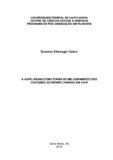| dc.creator | Calovi, Gustavo Ellwanger | |
| dc.date.accessioned | 2021-02-01T12:33:22Z | |
| dc.date.available | 2021-02-01T12:33:22Z | |
| dc.date.issued | 2018-01-30 | |
| dc.identifier.uri | http://repositorio.ufsm.br/handle/1/20279 | |
| dc.description.abstract | The present thesis tries to offer an interpretation on the question of the improvement
of the customs of the human race in the horizon of the Kantian practical philosophy. In
this perspective, the idea is defended that there is a textual basis in Kant to base the
belief in the improvement of the human race through the articulation of two fundamental
points: education and enlightenment. At first, we try to defend the idea that the
Enlightenment movement has a unity and that it will directly influence the flowering of
Kantian enlightened thought. Thus, it is understood that the critical use of reason added
to the defense of freedom and autonomy are the fundamental elements to size the
illustrated movement and that will influence Kant in the construction of his positioning
before the enlightenment. In the sequence, an interpretation will be presented on the
meaning of Aufklärung in Mendelssohn and Kant. Thus, it seeks to support a line of
argument that indicates the relationship between enlightenment and the proposal of
education advocated by Kant, given that its educational proposal is an important
element within the clarification since, through it, conditions for the individual to reach
autonomy. In order to systematize the discussion, in the third moment, we will present
the four purposes of education thought by Kant, because it is understood that, through
an appropriate pedagogical method, it becomes possible to prepare the individual to
exercise his moral autonomy. Lastly, the last chapter presents the relationship between
education and enlightenment and how belief in the improvement of customs can be
sustained. The thesis has, on the one hand, the objective of reconstructing the Kantian
argument regarding enlightenment, and, on the other hand, to demonstrate the
importance of education in the search for adulthood. In this way, the idea is maintained
that it is from the articulation between education and enlightenment that it is possible
to defend the idea of the improvement of manners of the human race. | eng |
| dc.description.sponsorship | Coordenação de Aperfeiçoamento de Pessoal de Nível Superior - CAPES | por |
| dc.language | por | por |
| dc.publisher | Universidade Federal de Santa Maria | por |
| dc.rights | Attribution-NonCommercial-NoDerivatives 4.0 International | * |
| dc.rights.uri | http://creativecommons.org/licenses/by-nc-nd/4.0/ | * |
| dc.subject | Iluminismo | por |
| dc.subject | Esclarecimento | por |
| dc.subject | Educação | por |
| dc.subject | Melhoramento | por |
| dc.subject | Enlightenment | eng |
| dc.subject | Enlightened | eng |
| dc.subject | Education | eng |
| dc.subject | Improvement | eng |
| dc.title | A Aufklärung como forma de melhoramento dos costumes do gênero humano em Kant | por |
| dc.title.alternative | The Aufklärung as a form of improvement of the customs of the human gender in Kant | eng |
| dc.type | Tese | por |
| dc.description.resumo | A presente tese procura oferecer uma interpretação acerca da questão do
melhoramento dos costumes do gênero humano no horizonte da filosofia prática
kantiana. Nessa perspectiva, advoga-se a ideia de que há uma base textual em Kant
para fundamentar a crença no melhoramento do gênero humano mediante a
articulação de dois pontos fundamentais: educação e esclarecimento. Em um primeiro
momento, busca-se defender a ideia de que o movimento iluminista possui uma
unidade e que essa influenciará diretamente o florescimento do pensamento ilustrado
kantiano. Assim, entende-se que o uso crítico da razão somado à defesa da liberdade
e da autonomia são os elementos fundamentais para dimensionar o movimento
ilustrado e que vão influenciar Kant na edificação de seu posicionamento frente ao
esclarecimento. Na sequência, apresentar-se-á uma interpretação sobre o significado
de Aufklärung em Mendelssohn e Kant. Assim, busca-se sustentar uma linha de
argumentação que indique a relação entre o esclarecimento e a proposta de educação
defendida por Kant, dado que a sua proposta educacional figura como um elemento
importante dentro do esclarecimento, uma vez que, através dela, criam-se condições
para que o indivíduo chegue à autonomia. Para sistematizar a discussão, no terceiro
momento, apresentar-se-ão as quatro finalidades da educação pensadas por Kant,
pois se entende que, através de um método pedagógico apropriado, torna-se possível
preparar o indivíduo para exercer a sua autonomia moral. Por fim, no último capítulo,
apresenta-se a relação entre educação e esclarecimento e o modo como pode ser
sustentada a crença no melhoramento dos costumes. A tese tem, por um lado, o
objetivo de reconstruir a argumentação kantiana referente ao esclarecimento e, por
outro, demonstrar a importância da educação no tocante à busca da maioridade.
Desse modo, sustenta-se a ideia de que é a partir da articulação entre educação e
esclarecimento que seja possível defender a ideia do melhoramento dos costumes do
gênero humano. | por |
| dc.contributor.advisor1 | Krassuski, Jair Antônio | |
| dc.contributor.advisor1Lattes | http://lattes.cnpq.br/5559214547314711 | por |
| dc.contributor.referee1 | Hamm, Christian Viktor | |
| dc.contributor.referee1Lattes | http://lattes.cnpq.br/5301026925485532 | por |
| dc.contributor.referee2 | Madrid, Nuria Sánchez | |
| dc.contributor.referee2Lattes | http://lattes.cnpq.br/6661853466978546 | por |
| dc.contributor.referee3 | Zanella, Diego Carlos | |
| dc.contributor.referee3Lattes | http://lattes.cnpq.br/1020784920637607 | por |
| dc.contributor.referee4 | Cortes, Rafael da Silva | |
| dc.contributor.referee4Lattes | http://lattes.cnpq.br/4000550275287029 | por |
| dc.creator.Lattes | http://lattes.cnpq.br/3750158419588400 | por |
| dc.publisher.country | Brasil | por |
| dc.publisher.department | Filosofia | por |
| dc.publisher.initials | UFSM | por |
| dc.publisher.program | Programa de Pós-Graduação em Filosofia | por |
| dc.subject.cnpq | CNPQ::CIENCIAS HUMANAS::FILOSOFIA | por |
| dc.publisher.unidade | Centro de Ciências Sociais e Humanas | por |



